The number of Americans age 65 and up is increasing fast and set to hit 80 million by 2040. All those elderly people will need a great deal ofmedica ...
You might consider targeting a niche, such as live-in nannies.
We earn commissions if you shop through the links below. Read more
Written by: Carolyn Young
Carolyn Young is a business writer who focuses on entrepreneurial concepts and the business formation. She has over 25 years of experience in business roles, and has authored several entrepreneurship textbooks.
Edited by: David Lepeska
David has been writing and learning about business, finance and globalization for a quarter-century, starting with a small New York consulting firm in the 1990s.
Published on April 30, 2023

Investment range
$4,800 - $9,300
Revenue potential
$90,000 - $240,000 p.a.
Time to build
3-6 months
Profit potential
$63,000 - $168,000 p.a.
Industry trend
Growing
Commitment
Flexible
Important elements to think about when starting your nanny agency:
Michelle Kelsey’s Entrepreneurial Journey in the World of Childcare
You May Also Wonder:
Is a nanny agency profitable?
Whether a nanny agency is profitable depends on various factors such as location, competition, demand for services, and pricing strategy. However, nanny agencies can be profitable businesses if they are run efficiently and effectively.
What is the growth potential of a nanny agency?
The growth potential of a nanny agency can be significant, especially in areas with a high demand for childcare services. As more families seek quality and reliable childcare, the demand for nanny services is expected to increase.
What type of business is a nanny agency?
A nanny agency is a service-based business, providing a matching service between families and qualified nannies. It falls under the category of the childcare industry.
Can you start a nanny agency on the side?
Starting a nanny agency on the side is possible, but it may require significant time and effort to get the business off the ground. Starting small, by focusing on a specific geographic area or a particular niche, and gradually expanding the business as it grows may be a good strategy for starting a nanny agency on the side.
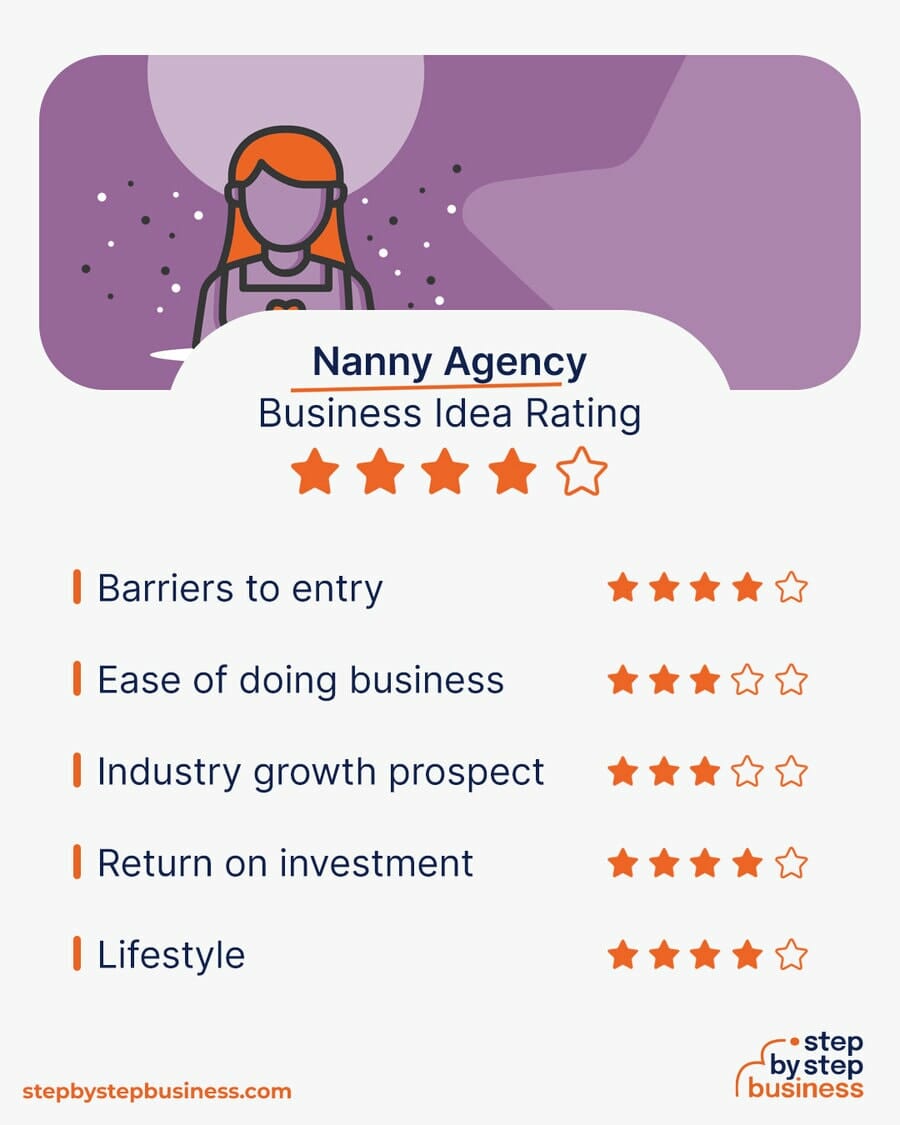

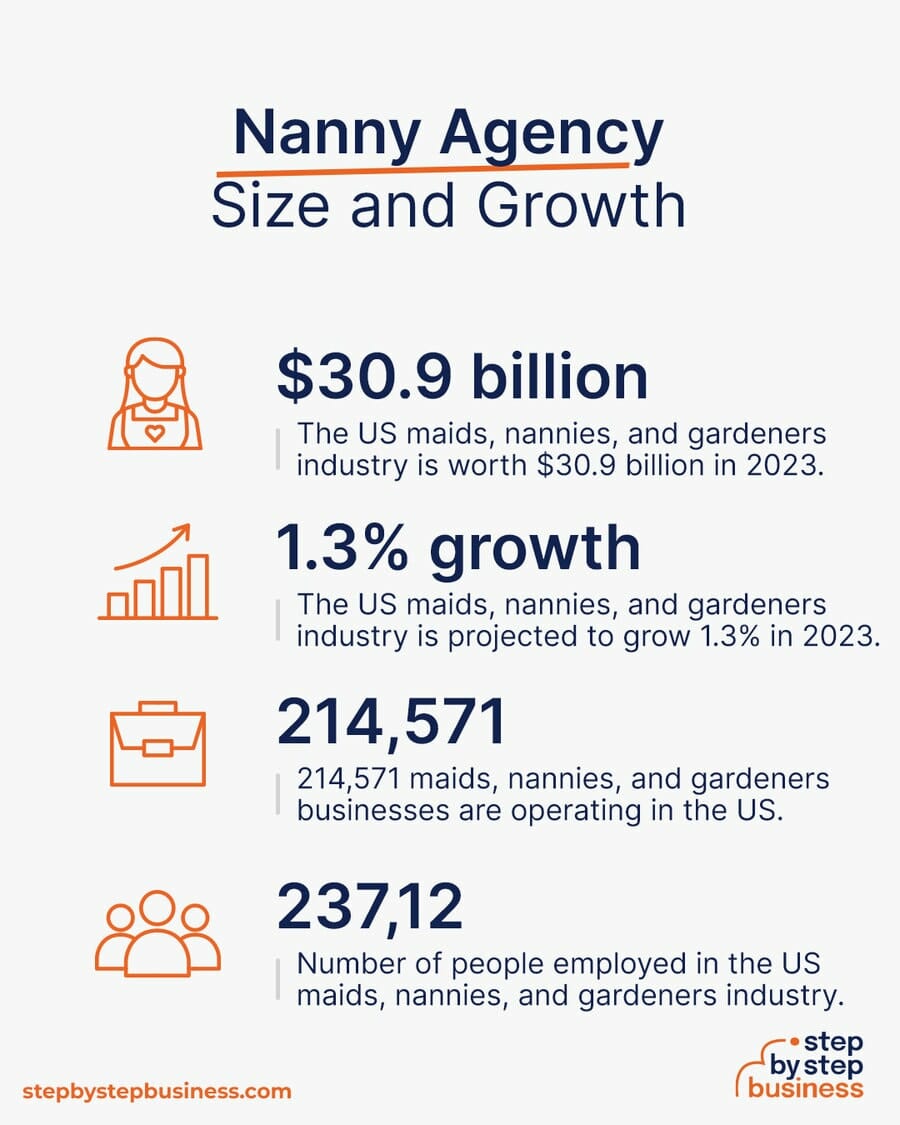
Nanny agencies are part of the maids, nannies, and gardeners industry.
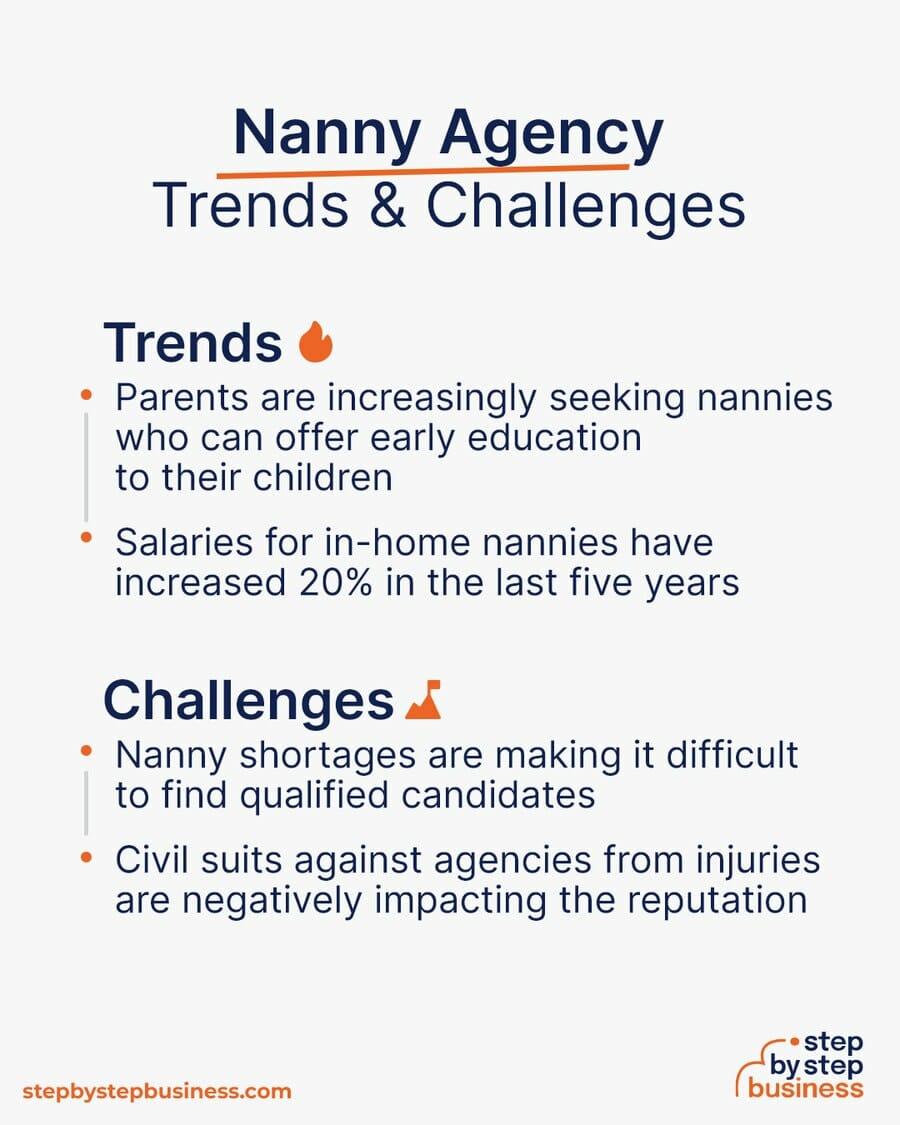
Trends
Challenges
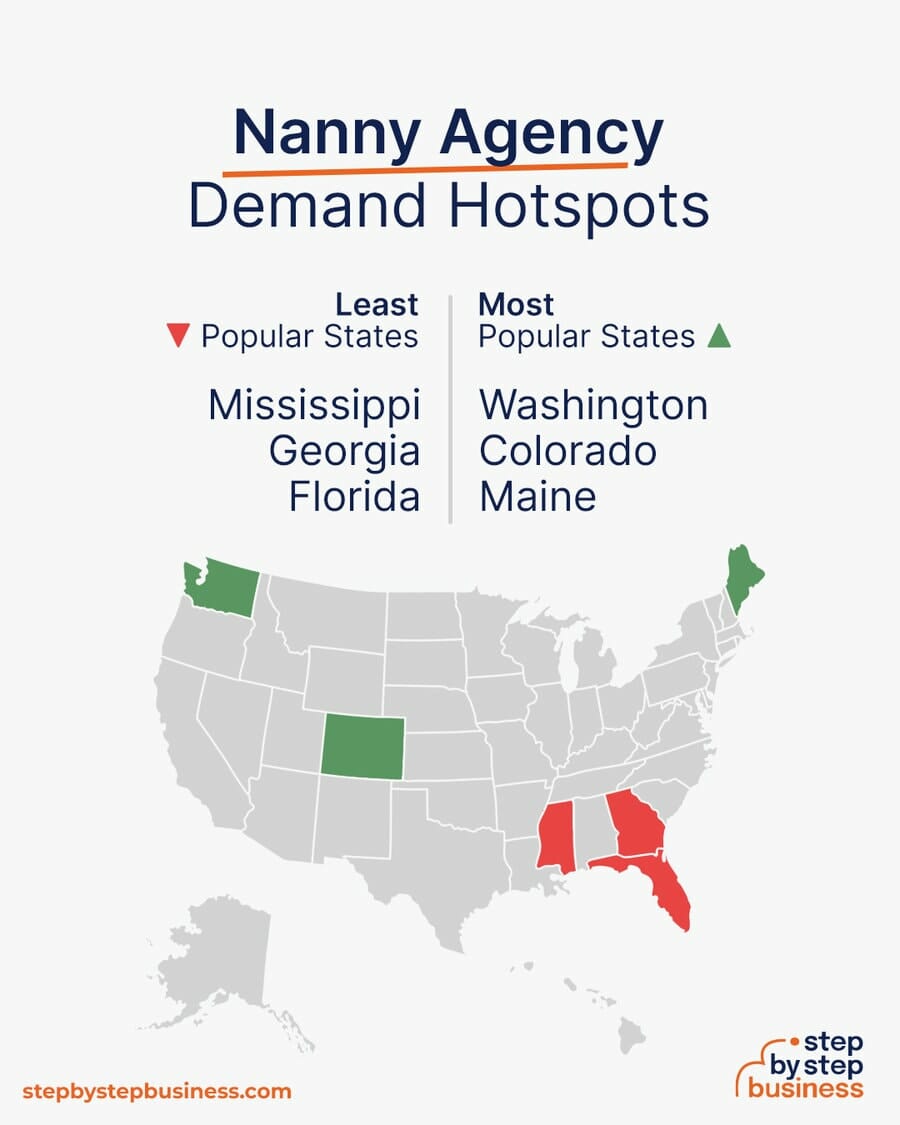
Startup costs for a nanny agency range from $5,000 to $9,000. The largest expenses are a computer and a marketing budget.
| Start-up Costs | Ballpark Range | Average |
|---|---|---|
| Setting up a business name and corporation | $100 - $500 | $300 |
| Business licenses and permits | $100 - $300 | $200 |
| Insurance | $100-$500 | $300 |
| Website | $500 - $1,000 | $750 |
| Computer | $1,000 - $2,000 | $1,500 |
| Sales and Marketing budget | $3,000 - $5,000 | $4,000 |
| Total | $4,800 - $9,300 | $7,050 |
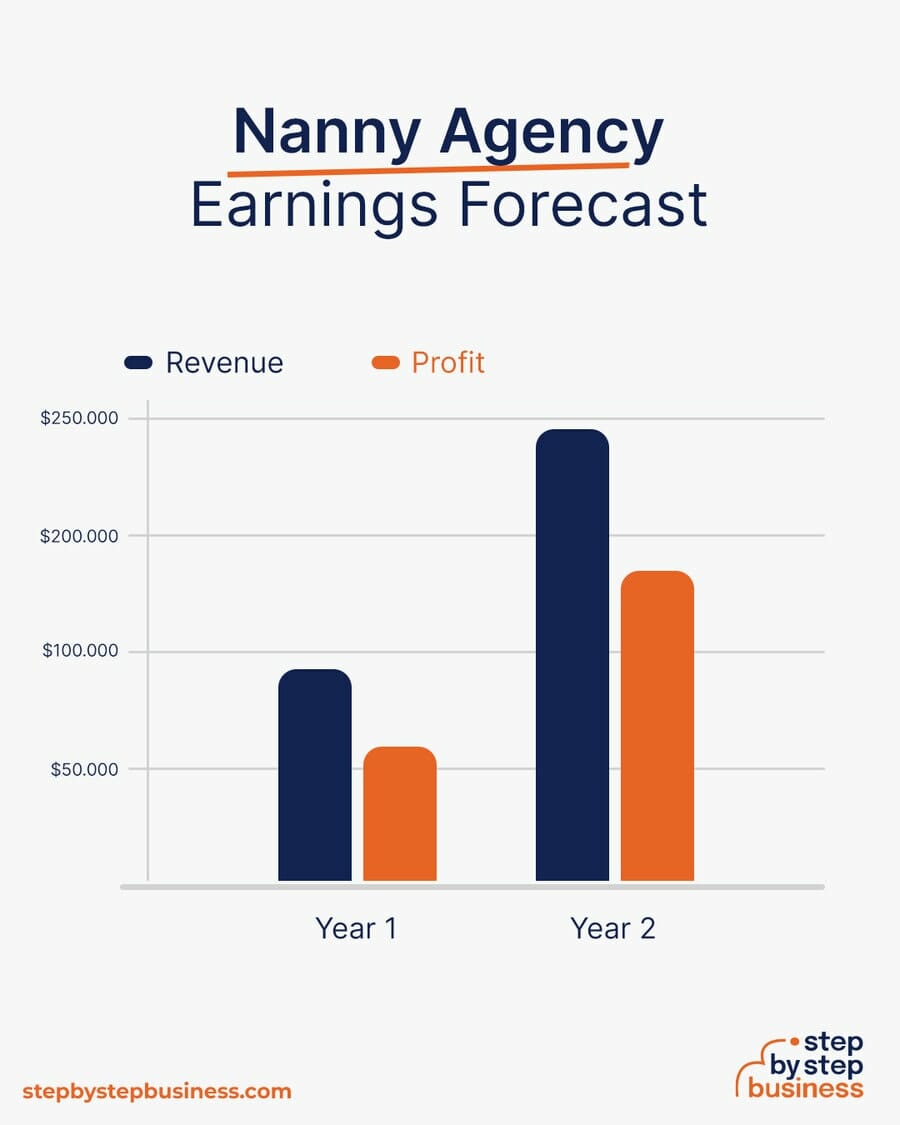
Nanny placement fees are generally either 10% to 20% of the nanny’s salary, or a flat fee which averages about $2,500. Your profit margin after the costs of marketing and background and driving record checks should be about 70%
In your first year or two, you could to three placements per month, bringing in $90,000 in revenue. This would mean $63,000 in profit, assuming that 70% margin.
As you gain traction, you might have eight placements per month. With annual revenue of $240,000, you’d make a tidy profit of $168,000.
There are a few barriers to entry for a nanny agency. Your biggest challenges will be:

Now that you know what’s involved in starting a nanny agency, it’s a good idea to hone your concept in preparation to enter a competitive market.
Market research could give you the upper hand even if you’ve got the perfect product. Conducting robust market research is crucial, as it will help you better understand your customers, your competitors, and the broader business landscape.
Research nanny agencies in your area to examine their services, price points, and customer reviews.
This should identify areas where you can strengthen your business and gain a competitive edge to make better business decisions.
You’re looking for a market gap to fill. For instance, maybe the local market is missing a nanny placement agency that also places babysitters, or a nanny referral agency that provides nannies who offer newborn care.
You might consider targeting a niche, such as live-in nannies.
This could jumpstart your word-of-mouth marketing and attract clients right away.
In addition to nanny placement, you could also connect parents with babysitters. You could even expand to other types of in home service providers like housekeepers or cooks.
Starting a nanny agency requires strategic recruitment of qualified childcare workers:
Your placement fees should be based on market prices in your area, but also on your costs.
Once you know your costs, use our profit margin calculator to determine your mark-up and final price points. Remember, the prices you use at launch should be subject to change if warranted by the market.
You’ll have two target markets – nannies and parents. Both could be in any demographic group, so you should market on both Instagram and Facebook.
In the early stages, you may want to run your business from home to keep costs low. But as your business grows, you’ll likely need to hire workers for various roles and may need to rent out an office You can find commercial space to rent in your area on sites such as Craigslist, Crexi, and Instant Offices.

Here are some ideas for brainstorming your business name:
Once you’ve got a list of potential names, visit the website of the US Patent and Trademark Office to make sure they are available for registration and check the availability of related domain names using our Domain Name Search tool. Using “.com” or “.org” sharply increases credibility, so it’s best to focus on these.
Finally, make your choice among the names that pass this screening and go ahead and reserve your business name with your state, start the trademark registration process, and complete your domain registration and social media account creation.
Your business name is one of the key differentiators that sets your business apart. Once you pick a name, reserve it and start with the branding, it’s hard to switch to a new name. So be sure to carefully consider your choice before moving forward.
Here are the key components of a business plan:

If you’ve never created a business plan, it can be an intimidating task. You might consider hiring a business plan specialist to create a top-notch business plan for you.
Registering your business is an absolutely crucial step — it’s the prerequisite to paying taxes, raising capital, opening a bank account, and other guideposts on the road to getting a business up and running.
Plus, registration is exciting because it makes the entire process official. Once it’s complete, you’ll have your own business!
Your business location is important because it can affect taxes, legal requirements, and revenue. Most people will register their business in the state where they live, but if you are planning to expand, you might consider looking elsewhere, as some states could offer real advantages when it comes to nanny agencies.
If you’re willing to move, you could really maximize your business! Keep in mind, it’s relatively easy to transfer your business to another state.
Business entities come in several varieties, each with its pros and cons. The legal structure you choose for your nanny agency will shape your taxes, personal liability, and business registration requirements, so choose wisely.
Here are the main options:

We recommend that new business owners choose LLC as it offers liability protection and pass-through taxation while being simpler to form than a corporation. You can form an LLC in as little as five minutes using an online LLC formation service. They will check that your business name is available before filing, submit your articles of organization, and answer any questions you might have.
Choose Your State
The final step before you’re able to pay taxes is getting an Employer Identification Number, or EIN. You can file for your EIN online or by mail or fax: visit the IRS website to learn more. Keep in mind, if you’ve chosen to be a sole proprietorship you can simply use your social security number as your EIN.
Once you have your EIN, you’ll need to choose your tax year. Financially speaking, your business will operate in a calendar year (January–December) or a fiscal year, a 12-month period that can start in any month. This will determine your tax cycle, while your business structure will determine which taxes you’ll pay.
The IRS website also offers a tax-payers checklist, and taxes can be filed online.
It is important to consult an accountant or other professional to help you with your taxes to ensure you are completing them correctly.
Securing financing is your next step and there are plenty of ways to raise capital:
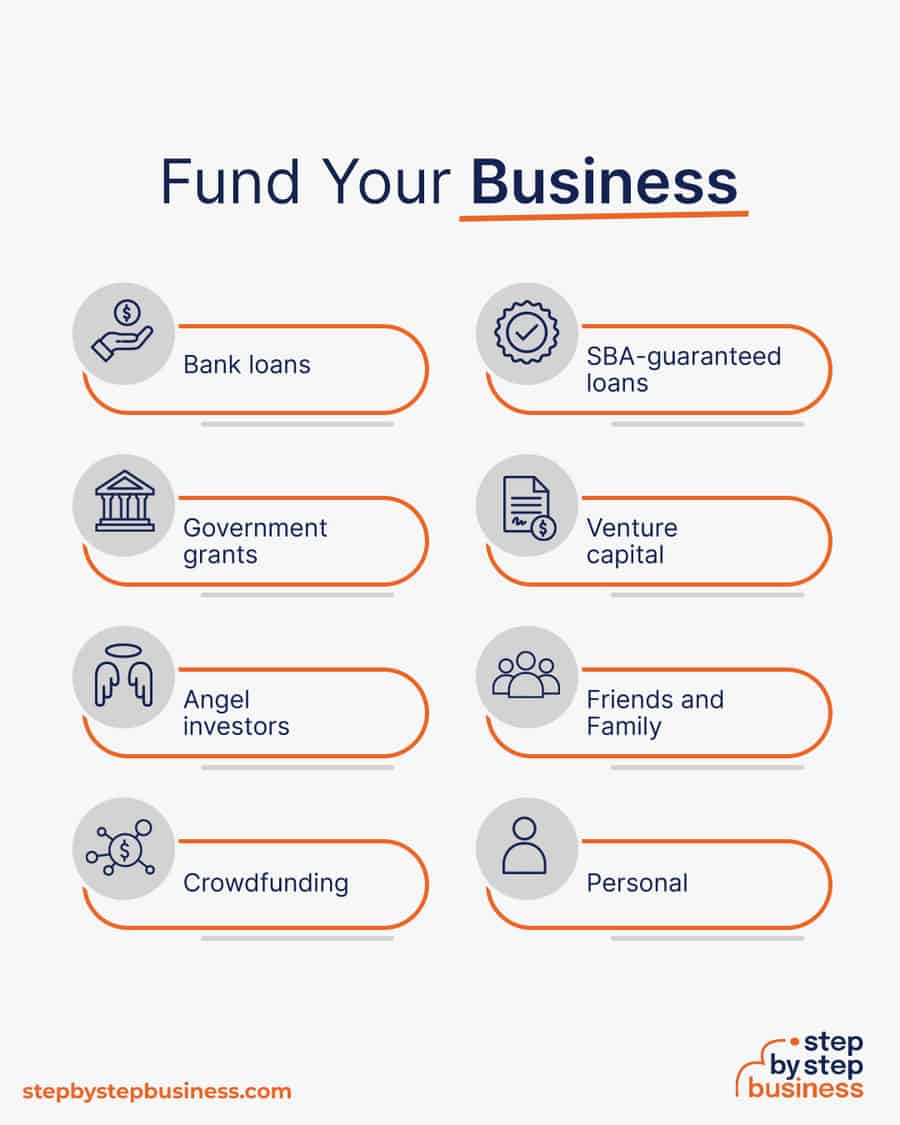
Bank and SBA loans are probably the best option, other than friends and family, for funding a nanny agency business. You might also try crowdfunding if you have an innovative concept.

Starting a nanny agency business requires obtaining a number of licenses and permits from local, state, and federal governments.
Federal regulations, licenses, and permits associated with starting your business include doing business as (DBA), health licenses and permits from the Occupational Safety and Health Administration (OSHA), trademarks, copyrights, patents, and other intellectual properties, as well as industry-specific licenses and permits.
While you likely don’t need a nanny agency license, you may want to consider only placing nannies that have a certification from the U.S. Nanny Association.
You may also need state-level and local county or city-based licenses and permits. The license requirements and how to obtain them vary, so check the websites of your state, city, and county governments or contact the appropriate person to learn more.
You could also check this SBA guide for your state’s requirements, but we recommend using MyCorporation’s Business License Compliance Package. They will research the exact forms you need for your business and state and provide them to ensure you’re fully compliant.
This is not a step to be taken lightly, as failing to comply with legal requirements can result in hefty penalties.
If you feel overwhelmed by this step or don’t know how to begin, it might be a good idea to hire a professional to help you check all the legal boxes.
Before you start making money, you’ll need a place to keep it, and that requires opening a bank account.
Keeping your business finances separate from your personal account makes it easy to file taxes and track your company’s income, so it’s worth doing even if you’re running your nanny agency business as a sole proprietorship. Opening a business bank account is quite simple, and similar to opening a personal one. Most major banks offer accounts tailored for businesses — just inquire at your preferred bank to learn about their rates and features.
Banks vary in terms of offerings, so it’s a good idea to examine your options and select the best plan for you. Once you choose your bank, bring in your EIN (or Social Security Number if you decide on a sole proprietorship), articles of incorporation, and other legal documents and open your new account.
Business insurance is an area that often gets overlooked, yet it can be vital to your success as an entrepreneur. Insurance protects you from unexpected events that can have a devastating impact on your business.
Here are some types of insurance to consider:


As opening day nears, prepare for launch by reviewing and improving some key elements of your business.
Being an entrepreneur often means wearing many hats, from marketing to sales to accounting, which can be overwhelming. Fortunately, many websites and digital tools are available to help simplify many business tasks.
You may want to use industry-specific software, such as KANTATA or NannyLogic, to manage your applicants, clients, and placements.
Website development is crucial because your site is your online presence and needs to convince prospective clients of your expertise and professionalism. You can create your own website using services like WordPress, Wix, or Squarespace. This route is very affordable, but figuring out how to build a website can be time-consuming. If you lack tech-savvy, you can hire a web designer or developer to create a custom website for your business.
Your customers are unlikely to find your website, however, unless you follow Search Engine Optimization (SEO) practices. SEO will help your website appear closer to the top in relevant search results, a crucial element for increasing sales.
Make sure that you optimize calls to action on your website. Experiment with text, color, size, and position of calls to action such as “Find Nannies Now” or “Apply”. This can sharply increase placements and nanny applications.
Here are some powerful marketing strategies for your future business:

Unique selling propositions, or USPs, are the characteristics of a product or service that sets it apart from the competition. Customers today are inundated with buying options, so you’ll have a real advantage if they are able to quickly grasp how your nanny agency meets their needs or wishes. It’s wise to do all you can to ensure your USPs stand out on your website and in your marketing and promotional materials, stimulating buyer desire.
Global pizza chain Domino’s is renowned for its USP: “Hot pizza in 30 minutes or less, guaranteed.” Signature USPs for your nanny agency business could be:
You may not like to network or use personal connections for business gain. But your personal and professional networks likely offer considerable untapped business potential. Maybe that Facebook friend you met in college is now running a nanny agency business, or a LinkedIn contact of yours is connected to dozens of potential clients. Maybe your cousin or neighbor has been working in nanny agencies for years and can offer invaluable insight and industry connections.
The possibilities are endless, so it’s a good idea to review your personal and professional networks and reach out to those with possible links to or interest in nanny agencies. You’ll probably generate new customers or find companies with which you could establish a partnership.

If you’re starting out small from a home office, you may not need any employees. But as your business grows, you will likely need workers to fill various roles. Potential positions for a nanny agency business include:
At some point, you may need to hire all of these positions or simply a few, depending on the size and needs of your business. You might also hire multiple workers for a single role or a single worker for multiple roles, again depending on need.
Free-of-charge methods to recruit employees include posting ads on popular platforms such as LinkedIn, Facebook, or Jobs.com. You might also consider a premium recruitment option, such as advertising on Indeed, Glassdoor, or ZipRecruiter. Further, if you have the resources, you could consider hiring a recruitment agency to help you find talent.

A nanny can be a great addition to a household, but parents need to feel confident in the nanny they hire. With your own nanny agency, you’ll be doing the hard work for those parents, ensuring that the nannies you place are qualified and trustworthy. You’ll also be making a nice living.
You’ve got the business savvy now, so you’re ready to get your successful nanny agency going!

Published on December 1, 2022
The number of Americans age 65 and up is increasing fast and set to hit 80 million by 2040. All those elderly people will need a great deal ofmedica ...
Read Now

Published on July 29, 2022
Just about everybody wants to live in a warm, welcoming close-knit community, and you can help build one by starting a business that helps peopleliv ...
Read Now

Published on July 21, 2022
If you love spending time with toddlers, newborns and growing youngsters, starting a business related to their care might come naturally for you. It ...
Read Now
No thanks, I don't want to stay up to date on industry trends and news.
It’s a shame that this article didn’t provide any resources from the leading organizations that work with nanny agencies – Association of Premier Nanny Agencies (APNA) and International Nanny Association (INA). Both provide great resources for those wanting to start an agency, resources to many of the steps and services recommended in this article. The provide business webinars and virtual and in-person conferences for agencies to learn and grow.